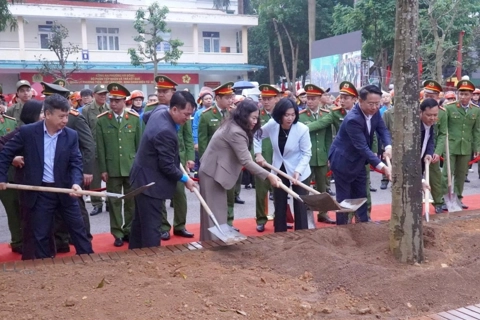Social Affairs
Vietnamese students spend US$3-4 billion a year on overseas study: Minister
Jun 06, 2018 / 04:51 PM
Vietnamese students spend US$3-4 billion Vietnamese a year on overseas study, which is a huge amount of money, said the Minister of Education Phung Xuan Nha at the question-and-answer session of the 14th National Assembly’s fifth plenum in Hanoi on June 6.
Three groups of questions National Assembly deputies grilled the minister about were the current status and solutions to improve the quality of higher education; management of preschool education; and measures to overcome moral degradation, lifestyle for teachers and students at school.
The US$ 3-4 billion Vietnamese spend every year on overseas study, in the eyes of analysts, is a reflection of the poor-quality education at local schools.
The number of Vietnamese students studying abroad in the last five years soared by 675 percent. Bellerbys College belonging to Study Group in the UK, present in Vietnam since 2000, reported that it has educated over 1,000 Vietnamese students.
Open Doors, a US-based international education exchange institution, showed that Vietnam is among the 10 countries with the highest numbers of students studying in the US.
Meanwhile, according to the Ministry of Education and Training, the number of Vietnamese overseas students has been increasing rapidly. There are 110,000 students studying in 47 countries and territories.
Ten percent of the students study on the state budget, governments’ education exchange programs and scholarships granted by schools. Meanwhile, the others are self-financed students.
Studying overseas is considered quite normal in the context of international integration. However, analysts believe this, to some extent, shows the students’ disappointment about domestic education.
Professor Nguyen Minh Duong, member of the government’s national council for education and human resources development, noted that Vietnam is now at a risk of lacking a workforce qualified enough to satisfy the requirements of the industrialization and modernization process.
Duong noted that existing training establishments have been following out-of-date training curricula which put theory before practice. This explains why the majority of Vietnamese school graduates cannot meet job requirements. Around 200,000 graduates of higher education cannot find a job annually, the fact which Minister Nha said is normal.
Back to the question-and-answer session of the 14th National Assembly’s fifth meeting, the National Assembly (NA) proposes that Vietnamese Government continues reviewing and refining education policies, especially those remote areas where ethnics live, early implementing the textbook renewal program, bringing into full play the human potential of Vietnam, meeting the requirements of the industrial revolution 4.0.
The NA proposes the Government soon plan the network of universities, build universities to reach the regional and world level, attract non-state economic sectors to participate in education.
The NA also urges the Government to soon develop and approve a new general education program that would not put pressure on students. Early re-planning the team of teachers, meeting the needs in the new situation to ensure teaching quality are other requests.
To boost the socialization of preschool education, the Government is requested to ntensify the inspection and supervision of pre-school education establishments, enhance teachers' responsibility, regulate teacher morality, and adopt codes of conduct for evaluation and strengthening security.
Finally, the National Assembly strongly recommends strict handling violations of law in education and training.

Vietnamese spend US$ 3-4 billion a year on studying overseas
|
The number of Vietnamese students studying abroad in the last five years soared by 675 percent. Bellerbys College belonging to Study Group in the UK, present in Vietnam since 2000, reported that it has educated over 1,000 Vietnamese students.
Open Doors, a US-based international education exchange institution, showed that Vietnam is among the 10 countries with the highest numbers of students studying in the US.
Meanwhile, according to the Ministry of Education and Training, the number of Vietnamese overseas students has been increasing rapidly. There are 110,000 students studying in 47 countries and territories.
Ten percent of the students study on the state budget, governments’ education exchange programs and scholarships granted by schools. Meanwhile, the others are self-financed students.
Studying overseas is considered quite normal in the context of international integration. However, analysts believe this, to some extent, shows the students’ disappointment about domestic education.
Professor Nguyen Minh Duong, member of the government’s national council for education and human resources development, noted that Vietnam is now at a risk of lacking a workforce qualified enough to satisfy the requirements of the industrialization and modernization process.
Duong noted that existing training establishments have been following out-of-date training curricula which put theory before practice. This explains why the majority of Vietnamese school graduates cannot meet job requirements. Around 200,000 graduates of higher education cannot find a job annually, the fact which Minister Nha said is normal.

The Minister of Education Phung Xuan Nha
|
The NA proposes the Government soon plan the network of universities, build universities to reach the regional and world level, attract non-state economic sectors to participate in education.
The NA also urges the Government to soon develop and approve a new general education program that would not put pressure on students. Early re-planning the team of teachers, meeting the needs in the new situation to ensure teaching quality are other requests.
To boost the socialization of preschool education, the Government is requested to ntensify the inspection and supervision of pre-school education establishments, enhance teachers' responsibility, regulate teacher morality, and adopt codes of conduct for evaluation and strengthening security.
Finally, the National Assembly strongly recommends strict handling violations of law in education and training.









